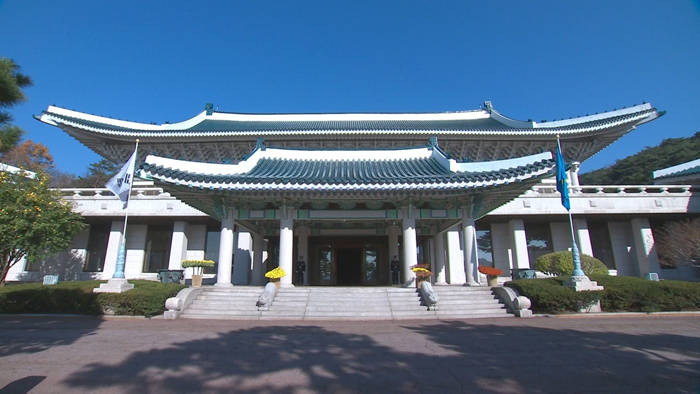Cheong Wa Dae: Japan's arbitration process offer unacceptable
By YonhapPublished : July 16, 2019 - 22:08
A couple of days ahead of the deadline set by Japan for South Korea to respond to its offer of a formal arbitration process over historical disputes, the office of President Moon Jae-in made clear Tuesday that it won't accept the call.
Cheong Wa Dae’s stern stance came amid Tokyo‘s threat of additional trade measures against South Korean companies. It heralds a possible deepening of the rift between the neighboring countries.
"There’s no change in the government‘s position,” a senior Cheong Wa Dae official told reporters. Asked whether that means Japan’s demand is unacceptable, the official said, “Yes it is. I think that‘s clearly conclusive.”
At the center of the latest Seoul-Tokyo stand-off is compensation of Koreans forced to toil at Japanese factories and mines during World War II. Korea was under Japan’s harsh colonial rule from 1910-45.
Cheong Wa Dae’s stern stance came amid Tokyo‘s threat of additional trade measures against South Korean companies. It heralds a possible deepening of the rift between the neighboring countries.
"There’s no change in the government‘s position,” a senior Cheong Wa Dae official told reporters. Asked whether that means Japan’s demand is unacceptable, the official said, “Yes it is. I think that‘s clearly conclusive.”
At the center of the latest Seoul-Tokyo stand-off is compensation of Koreans forced to toil at Japanese factories and mines during World War II. Korea was under Japan’s harsh colonial rule from 1910-45.

Japan argues that all reparation issues associated with the colonization were settled in a 1965 bilateral treaty on normalizing diplomatic ties.
Last year, however, South Korea‘s Supreme Court ordered Japanese firms to compensate forced labor victims who filed a civil suit seeking reparations. The court ruled that individuals had the right to seek reparations beyond the state-to-state accord.
The Moon administration has stated that it respects the court decisions.
In an apparent retaliatory step, Japan imposed stricter export restrictions against South Korea for some key materials used in the production of semiconductors and displays.
Japan is moving to take additional measures, including the removal of South Korea from a so-called “white list” of trusted importers.
The Cheong Wa Dae official said South Korea has no plan to deliver any response to Japan until the deadline. Tokyo is demanding the establishment of an arbitration panel brokered by a third country, as Seoul has already turned down its offer of a bilateral committee.
Seoul earlier proposed a joint fund put together by South Korean and Japanese firms to address the compensation issue but Japan rejected the proposal. Moon said his government has never said the joint fund is the only resolution, leaving the door open for an alternative.
The Cheong Wa Dae official, however, dismissed a news report that creating a fund, which would also involve the South Korean government, is being considered as another option.
"There’s nothing additional that we are reviewing,” the official said, stressing that what‘s important is to find a solution that is acceptable to victims.
Chung Eui-yong, a top Cheong Wa Dae official in charge of the National Security Office, reaffirmed that Seoul will deal “resolutely” with Tokyo’s use of trade as a political means.
"We will respond resolutely until the Japanese government retracts the measure,” he said during a meeting with senior ruling Democratic Party officials.
He urged Japan to cooperate with South Korea in its efforts for a diplomatic resolution.
Chung, a former diplomat and politician, criticized Japan for linking the export control with the Wassenaar Arrangement aimed at curbing the illicit transfer of sensitive dual-use goods and technologies.
The Japanese government had no consultations with South Korea before raising the issue, he pointed out.
He said it‘s a “very serious and reckless challenge that shakes the foundation of South Korea-Japan friendly relations,” which have been built arduously since the 1965 establishment of diplomatic ties.
At the policy coordination meeting, meanwhile, the presidential office and the ruling party agreed to give full support to local companies so as to minimize the fallout caused by Japan’s export ban.
"Cheong Wa Dae and the DP will help businesses seek alternatives and do our best to change our economic structure and strengthen competitiveness,” Rep. Cho Jeong-sik, policy chief of the DP, told reporters.
The two sides will also make concerted efforts to engage in diplomatic talks with Japan and other related nations and seek further international cooperation, he added. (Yonhap)








![[KH Explains] Hyundai's full hybrid edge to pay off amid slow transition to pure EVs](http://res.heraldm.com/phpwas/restmb_idxmake.php?idx=644&simg=/content/image/2024/04/18/20240418050645_0.jpg&u=20240419100350)







![[From the Scene] Monks, Buddhists hail return of remains of Buddhas](http://res.heraldm.com/phpwas/restmb_idxmake.php?idx=652&simg=/content/image/2024/04/19/20240419050617_0.jpg&u=20240419175937)

![[KH Explains] Hyundai's full hybrid edge to pay off amid slow transition to pure EVs](http://res.heraldm.com/phpwas/restmb_idxmake.php?idx=652&simg=/content/image/2024/04/18/20240418050645_0.jpg&u=20240419100350)

![[Today’s K-pop] Illit drops debut single remix](http://res.heraldm.com/phpwas/restmb_idxmake.php?idx=642&simg=/content/image/2024/04/19/20240419050612_0.jpg&u=)